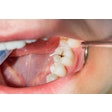New findings from an oral health study conducted this year by United Concordia Dental and Highmark show pharmacy costs can average $1,477 lower per year for diabetes patients with periodontitis who receive at least seven treatments annually for the disease.
United Concordia previously reported that periodontal treatment for individuals with diabetes was associated with a significant decrease in hospitalizations and doctor visits, delivering annual savings of $1,814 in medical care per patient per year, noted lead researcher Marjorie Jeffcoat, DMD, a professor and dean emeritus of the University of Pennsylvania School of Dental Medicine.
Earlier this year, the dental insurer released significant findings related to annual medical savings, hospitalizations, and doctor visits from its landmark study of 1.7 million patients. Dr. Jeffcoat used the same group of patients, who have both United Concordia dental and Highmark medical coverage, to conduct the pharmacy cost-savings analysis, according to the company.
United Concordia's oral health study, which is the largest of its kind, encompassing 1.7 million patients, shows that annual healthcare savings of more than $3,200 are possible when the medical and pharmacy savings are combined for individuals with diabetes who are treated for periodontitis and have at least seven annual visits as part of their therapy, according to James Bramson, DDS, chief dental officer for United Concordia.
The findings help broaden the argument for why it makes sense for employers to invest in robust chronic-disease-specific oral health programs, he added, noting that United Concordia is working with medical carriers and wellness companies to integrate the oral health component into employers' benefit and wellness programs.
The diabetes findings represent the first in a series of conclusions suggesting how appropriate dental treatment and maintenance can help predict lower medical expenses for various chronic medical conditions. Similar methodologies will be employed to examine the cost impact of treating periodontal disease in individuals who experienced preterm births, heart disease, and stroke.



















